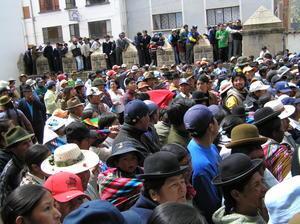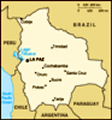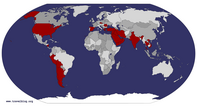Advertisement

 Awaiting Evo
Awaiting Evo
Bolivians await a glimse of their president The other night while sharing a Cusqueña with Mandy over dinner in Cusco, I began to go on and on about the political affairs of Bolivia. Then, it may have been the elevation, but Mandy convinced me that I should give some kind of a political update on the countries that we visit. I don’t know how well this will work for every country, but after spending six weeks in Bolivia, I have more first hand political experiences and opinions then I ever thought possible. I understand that my political views may differ from some of you who read this, and I won’t be offended if you disagree. I have been provided the opportunity to actually be surrounded by the poitical situations of countries that we only read about on the fifth page of our newspapers back home- if that! It is pretty exciting, and nerve-wracking at times, but I am enjoying this new vantage point.
This sort of update is difficult for me to begin because of the immensely long political background that had taken place in the whole continent of South America. I’ll try to keep my version brief, but I think it’s important to mention
the arrival of the Spanish on the continent almost 500 years ago and the subsequent slaughter and enslavement of natives along with the exploitation of its natural resources. With its vast wealth of gold, silver, and copper, Bolivia was a natural target for this exploitation. After almost 300 years of this, Different areas of South America began to gain independence. A man named Simon Bolivar had a lot to do with leading this independence movement, who also happens to be Bolivia's namesake.
The political history of Bolivia has always been extremely volatile with 192 coups in between its independence in 1825 and the early 1980´s. Since then, it has been slightly more stable, but in no way enjoys anything near the western definition of stability. In my opinion, this stability has come from Bolivian governments that were corrupt. They had the power and support to keep their positions through outside influences that cared little about internal Bolivian affairs. Instead, all that mattered was favorable economic agreements. During this time, a few people close to the government prospered, while the majority of citizens actually had a reduction in their already meager standard of living. Also, the profits of Bolivia’s
vast natural resources were now going to foreign companies.
The US has been highly involved in Bolivian Politics for quite some time now. Most notably, US backed and trained fighters who were responsible for the capture and killing of Che Guevera in the late 60´s, while combating the revolutionary movement here. More recently, the US has been pouring money in the form of aid into Bolivia in return for cooperation in fighting the war on drugs inside the country. The US is by far the largest foreign donor contributing at least 100 million per year to different projects including infrastructure, health, and police. However, this aspect isn’t much publicized or widely known among the Bolivian masses. What is known is that the US is trying to completely eradicate the growing of coca plants. This understandably doesn’t go over too well with the population who uses the leaves to chew or brew tea, which they have been doing for thousands of years. Coca is very much a part of their culture, and the people are not going to give it up just because there is a country thousands of miles away that has a drug problem with some chemically
manufactured by-product of the coca leaves. The coca leaves also have medicinal purposes including aiding in digestion and helping nausea along with combating altitude sickness. After trying coca tea and leaves many times it is very clear to me that this plant is has less of an actual effect on the body than a cup of coffee, and is probably less harmful as well. Nevertheless, the goal of the US had been to eradicate this plant by 2002. I must say the plan has somewhat backfired as there has been a resurgence of cultural pride in Bolivia, which has manifest itself in the election of their new president Evo Morales. Evo is their first indigenous president on top of being a previous coca farmer. This election is following a leftward trend that is present in almost all South American countries. The new governments range greatly in their ideals, and Bolivias would be considered on the more radical side.
In the past six weeks that we have been in Bolivia an amazing number of events have taken place that have made world news along with straining and changing world relations. It was eye-opening to experience these things first hand,

 The best spot in the house...
The best spot in the house...
These happy fans climbed a tree to get a better look at the president!inside of the country. First, while we were in Bolivia, there was a complete transportation strike that lasted for two days, which trapped us in a town called Potosi. Busses and cars were parked diagonally in every street and intersection blocking all travel, and apparently it was similar all across the country. The issue at stake was a proposed tax on bus tickets. A tax on transportation seems fair to my western mind. Everybody who travels in Bolivia would agree that the roads could use some improvement. However, this tax was only to be charged by companies with more than two busses. Also, the state of conducting business in Bolivia is a little less than controlled and organized. No establishment will give you a receipt for anything. If you ask for a receipt to avoid any later confusion or problems, your request is met with a blank stare and then you are shown a receipt book that is completely full. They then say that they are sorry, they have completely run out, and will not be able to provide you with one. My only guess is that if they did write your revenue down in the books they might have
to pay some sort of taxes. So, the bus companies felt as if they were being singled out for paying taxes, and this would give the business edge to small or illegitimate transportation companies. It is understandable to not want to pay taxes, and it is even more so if your government has been one of the extremely corrupt for many years. Assuming that the new government isn’t corrupt or as corrupt as previous ones, there will still be a very long road ahead securing a steady and fair revenue stream.
Also while we were in Bolivia, Evo made good on one of his campaign promises by making a move to take back a controlling stake in his country´s natural gas fields. Many standard large oil companies operate in Bolivia, the largest being owned by the government of Brazil. Its true that these companies have invested over one billion dollars in the natural gas fields. However, these companies attained their so-called rites under the former corrupt governments who made agreements that included very little regulations or revenue for Bolivia. Under these agreements, companies can operate while owing huge amounts of back taxes along with showing little regard for
the environment. Evo made his move by sending troops into the natural gas fields. Even though this sounds drastic, it was merely done as a show of force. Evo wants a controlling stake in this resource to be transitioned over to Bolivia within the next six months. The move didn’t go over so well with the world media. First, this little bit of instability sent energy prices a little higher, which nobody enjoys at this time. Second, many news reports called the move reckless and unjustified. Thirdly, outside stories told of how Bolivia was proposing extreme rate hikes. With Bolivia´s history of other countries exploiting their natural resources, I don’t blame them for taking back a controlling stake in their natural gas fields. I know that it’s not a very capitalist thing to say or do, but this is a country that capitalism has taken advantage of. It might be the best economic system for creating wealth, but it has definitely not been distributed fairly among developing nations. For a country that has the second largest natural gas reserves in S. America, almost nobody has heating or hot water, and much of the country is bitterly cold year round. These things have definitely become a luxury to Mandy and I over the past few months, but for many sick and young it could be a matter of life or death. It´s sad that the Bolivian people don´t have the infrastructure or the money to afford their own resources.
In a similar move, Evo´s government is drawing up plans to redistribute unused farmland to poor Bolivian farmers in the Amazon Basin. Even though it has been stated that farmland which is being used won’t be redistributed, this has many Brazilian farmers who acquired vast tracts of land during the 90´s nervous. Many Brazilian owned farms range between 10,000 and 100,000 acres, and were purchased through sketchy deals from a corrupt government. Anyways, this has some people outraged, and as always there is no easy solution.
The last major political event that happened while we were in Bolivia is probably the least popular with the US. Since Evo was elected, he has been increasing Bolivia’s closeness with Hugo Chavez, the far left leader of Venezuela, and Castro of Cuba. Both of these leaders have a personal commitment to speak out against the US, and have made huge efforts to recruit other countries to do the same. As you can imagine this is bound to cause some tension because of the large amount of aid that the US contributes to Bolivia. Both Venezuela and Cuba have also pledged aid for Bolivia along with 700 doctors from Cuba, medical education exchange programs, and enough money to construct and operate radio towers in remote villages to promote their political ideology. These efforts will add up to about 130 million over several years, much less than the 100 million a year from the US. However, this aid is highly publicized in Bolivia, and would definitely win in a popularity vote among the people.
Mandy and I say first hand how strong these new ties are. One day while we were in Copacabana, which is a small town on Lake Titicaca, we realized there were hundreds of police swarming the streets. Then, fireworks began going off and people were running and shouting. All of the commotion was over President Evo Morales coming for a speech. First, a string of SUVs pulled up in front of the cathedral and apparently Evo hurried inside. After waiting for about a half an hour, Evo left through a back door, and the crowd hurriedly ran after the pack of SUVs. Finally, the crowd ended up in a grassy field outside of the town medical clinic where apparently the speech / media-event was to be held. Mandy and I followed, and after being each handed a flag, we went inside. On one side of the paper was Bolivia’s flag, and on the other was a different flag with blue and white markings that I didn’t quite recognize. Then, as I looked toward Evo up on the stage, I noticed the huge banner across the top that read, ¨Gracias Cmdte. Fidel¨. I then realized this was a media event thanking Fidel Castro, and celebrating the ties between Bolivia, Cuba, and Venezuela. A representative from Cuba was there along with one from Venezuela. We didn’t get to stay for the whole event because we had a bus to catch, but what we did see made me think that the US government has really got to hate these new relations. After at least a half a century and billions of dollars combating revolutionary forces and ideology in Latin America, these countries are heading in that direction through democratic means.
With my American upbringing I can’t say that these relations make me completely comfortable. However, I do understand that these countries are trying to succeed and prosper without the strong influence of the U.S. I think it could be easily related to a child trying to escape the overbearing grasp of a parent. Everybody would like to be in control of their own destiny.
Bolivia still has a lot of change to undergo. I feel that it is a country that is desperately trying to find itself. It still needs to discover the delicate balance between its mainly indigenous population, its reliance on the rest of the world, and its vast natural resources. Given its turbulent history and past corruption this won’t be an easy transition. Nevertheless, the people here are empowered with the recent political events, and I don’t think they’ll accept anything less than positive change.
Advertisement
Tot: 0.184s; Tpl: 0.011s; cc: 22; qc: 110; dbt: 0.091s; 1; m:domysql w:travelblog (10.17.0.13); sld: 1;
; mem: 1.4mb











anonymous
non-member comment
Tom and Mary Louise
Thanks for a great in depth report!! What did you see as a presence of any US diplomats in these areas?? Or are they too busy picking coca leaves to look up and see what the Bolivian people are about??? Latin politics are always fervent!